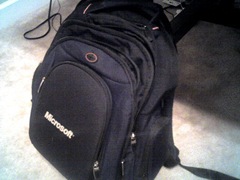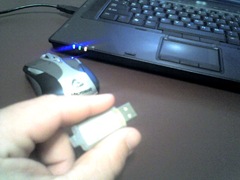Homework doesn't get lost when it is stored in the cloud
You would think in 20 years my habits would improve. I still carry valuable data in my backpack where it is at risk of getting torn, lost, or just buried under piles of extra stuff that I  carry around to feel prepared but never actually end up using. When I was in grade school, my valuable data included homework, notes from home, permission slips, order forms, etc. In college I carted around Zip Disks because I felt they were more robust than floppies and some of them would store over 100MB!
carry around to feel prepared but never actually end up using. When I was in grade school, my valuable data included homework, notes from home, permission slips, order forms, etc. In college I carted around Zip Disks because I felt they were more robust than floppies and some of them would store over 100MB!
In the professional world my data has evolved in to digital assets such as slides, spreadsheets, and whitepapers. These things have changed in form from crumpled up papers large diskettes to USB thumb drives but they still risk being lost or destroyed. Especially thumb drives. Mine has survived lost&found, the washing machine, and due to its size it sometimes takes a few minutes  for me to scour my backpack if it happen to slip out of its pocket and fall to the bottom.
for me to scour my backpack if it happen to slip out of its pocket and fall to the bottom.
Students who understand how to leverage Web 2.0 really have it made when it comes to transporting files. There are great online services who are competing for their attention. Last week I published a brief list of new Live services and how they could benefit Education. Two that I left out were Windows Live @ EDU and SkyDrive. These are solutions that include massive amounts of online storage. Live @ EDU currently allocates 5 GB for student mailboxes which you could obviously use for Emailing files to yourself to later access from a browser. SkyDrive is more directly an online storage solution. It is still in beta and currently only provides 500MB of storage. This is large enough for most documents but hopefully the available storage will be increased when the service moves out of testing (to something massive, I hope).
If you can drag and drop, you can protect and store files on your own hard drive "in the cloud" meaning it is hosted by Microsoft. You simply open the website, sign in using a username and password, and then upload your files. You decide whether others should have access, either by inviting them to sign in or by opening a folder for public access to anyone anonymously.
cloud" meaning it is hosted by Microsoft. You simply open the website, sign in using a username and password, and then upload your files. You decide whether others should have access, either by inviting them to sign in or by opening a folder for public access to anyone anonymously.
These services are very simple to use. They probably have a greater learning curve for most of today's adults than they would for young people who are already well acclimated with modern web based services and tools. So hopefully crumpled papers, Zip Disks, and yes even my trusty USB thumb drive will soon be considered artifacts of a world before we could store things in "the cloud".
Technorati tags: Microsoft, SkyDrive, Live
Comments
- Anonymous
September 13, 2007
The comment has been removed